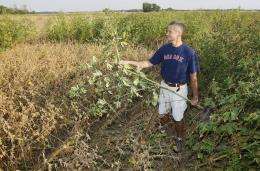Dicamba-glyphosate combo works well in resistant soybeans

Soybeans engineered to be resistant to the herbicides dicamba and glyphosate performed well in field tests with weeds that have become resistant to glyphosate alone.
Bill Johnson, a Purdue professor of weed science, said dicamba has been known to work well on weeds that appear in soybean fields, but it had to be applied to the ground long before soybeans were planted because the crops also were susceptible to the herbicide. A new dicamba-resistant soybean, which also is resistant to glyphosate, can handle an application after planting, according to Johnson's findings in the journal Crop Management.
"This is a powerful postemergence herbicide that we can pair with glyphosate to kill glyphosate-resistant weeds," Johnson said.
More than 90 percent of soybeans and corn planted in the United States are resistant to glyphosate, the active ingredient in the popular herbicide Roundup. Overuse has created glyphosate-resistant weeds that can lower crop yields.
"There has been an overreliance on just using glyphosate in many soybean fields. We have created an environment that has selected for glyphosate-resistant weeds," Johnson said.
Johnson used field tests from 14 locations in Georgia, Illinois, Indiana, Kentucky, Missouri, Nebraska, North Carolina, Ohio, South Dakota and Tennessee to evaluate dicamba's effectiveness on broadleaf weeds before and after soybean planting.
The study showed that dicamba applied just before planting provided 97 percent control of common lambsquarter and horseweed three weeks after treatment, but was slightly less effective on smooth pigweed, giant ragweed, velvetleaf, palmer amaranth, waterhemp and morning glory.
Dicamba treatments postemergence improved control of velvetleaf, smooth pigweed, morning glory and waterhemp. When combined with glyphosate, dicamba gave 30 percent to 65 percent better control over glyphosate-resistant palmer amaranth, waterhemp, horseweed and giant ragweed compared to glyphosate alone.
Johnson said he would continue to study dicamba-glyphosate usage to understand how the combination can be best utilized in different conditions and situations. Monsanto, which donated seeds, partly funded his research.
Provided by Purdue University
















